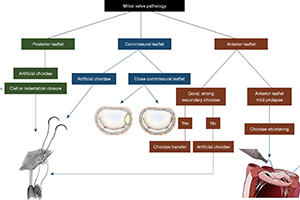Robotic mitral valve repair in National Taiwan University Hospital: 10-year results
Abstract
Background: With the help of robotic surgical systems and their 3-dimensional, high-resolution imaging, mitral repair with long shaft instruments and endo-wrist functionality has become a feasible reality. Patients benefit from maintained thoracic cage integrity, reduced surgical trauma, and faster return to normal functional activity. We describe National Taiwan University Hospital’s 10-year experience with robotic-assisted mitral valve repair procedures for repairing mitral regurgitation.
Methods: We performed a retrospective observational cohort study of patients undergoing robotic-assisted mitral valve repair for severe mitral regurgitation at National Taiwan University Hospital. Between January 2012 and September 2022, 450 consecutive patients underwent robotic mitral valve repair with or without additional cardiac procedures. All procedures were completed by a single surgical team.
Results: Four hundred and fifty patients, with 272 (60.4%) isolated mitral repairs and 178 (39.6%) combined additional (one or more) cardiac procedures were performed. The Euroscore II estimate mortality was 3.1%±2.7%. The average cardiopulmonary bypass (CPB) time was 124±42 minutes, and the average operation time was 165±51 minutes. Perioperative and 30-day mortality was observed in one (0.22%) patient. Mean intensive care unit stay was 26.5±26.0 hours. Postoperative stroke was observed in one (0.22%) patient and new-onset atrial fibrillation was observed in 71 (15.78%) patients. All patients were in less than mild mitral regurgitation and 422 (93.78%) had none or trace regurgitation at discharge. Freedom from moderate mitral regurgitation was 97.6%, and freedom from mitral valve reoperation was 98% at 10 years.
Conclusions: With standardized robotic procedures and non-compromised repair techniques, excellent short-term outcomes and long-term valve repair durability can be achieved in experienced centers.
Cover






